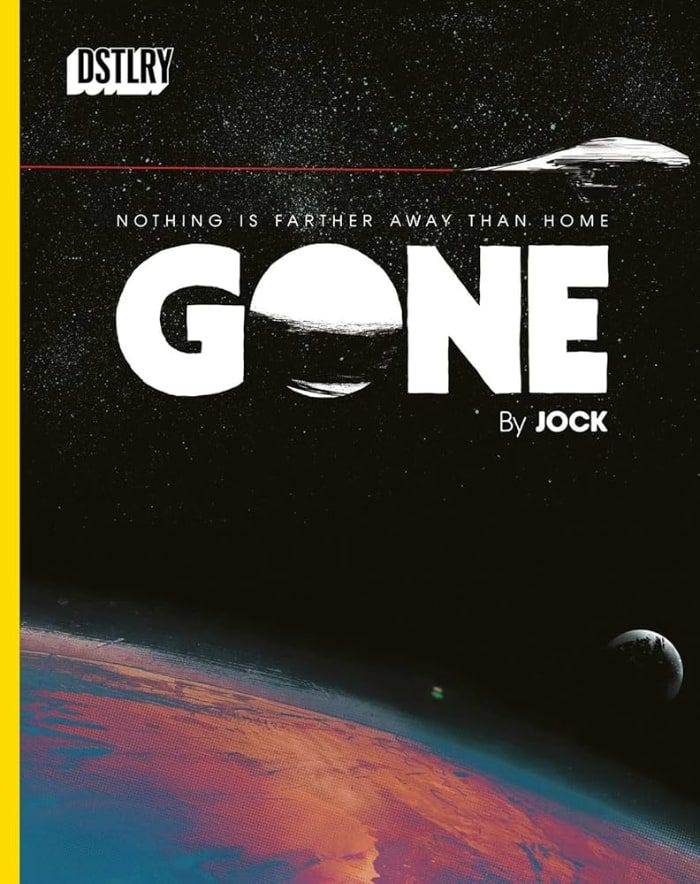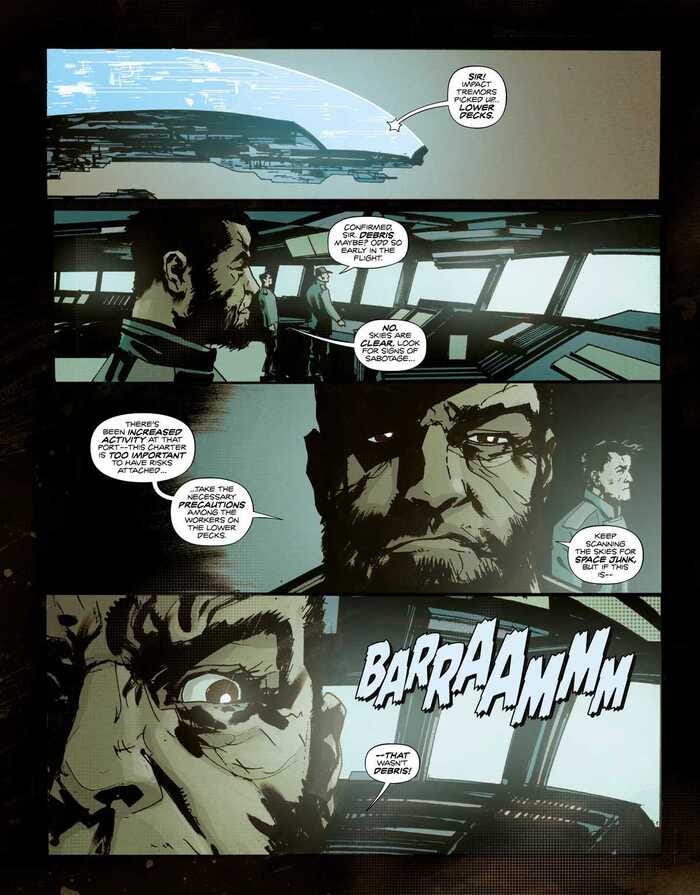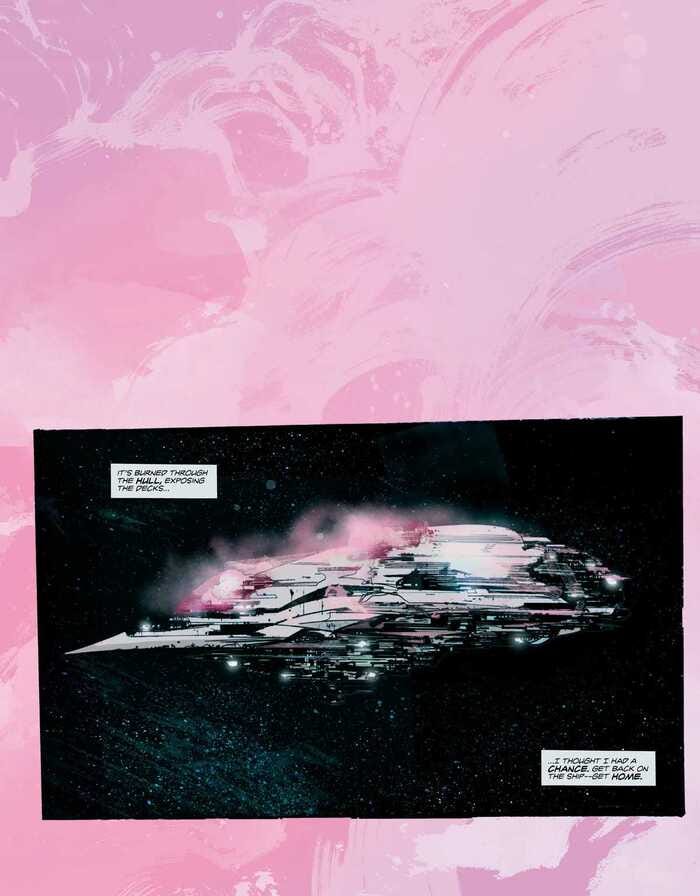Gone, by Jock: Bad sci-fi stories can be very tiresome
Now I'm trying to figure out if Jock was always bad at comics.
Gone
Story and art by Jock
Colors by Lee Loughridge and Jock
Letters by Andworld Designs
Published by DSTLRY, 2024
Buy it
The artist who goes by the pen name of Jock has been involved in the world of comics for decades, mostly as a cover artist but also sometimes as both an interior artist and a writer. He’s good at creating striking imagery, and he has a nice design sense. His art often features chunky figures, rough lines, and a nice use of black, often combining elements in a collage-like style to come up with memorable images, like a cover of a Batman comic that depicted the Joker’s face with messy red lips and dark features that dissolve into a cloud of flying bats.
However, covers can be one thing, but art that is good at telling comics stories is another. Jock has occasionally drawn the interiors of comics, but I don’t know how successful he’s been. I remember liking The Losers, which was a cool action/crime series from the mid-2000s written by Andy Diggle (it eventually got turned into a movie that was…fine), but I haven’t revisited it in the years since, so I don’t know how well it has held up. I know Jock has written and drawn some Batman comics, but I haven’t read those either. But judging by the quality of storytelling on display in this new book of his, I don’t have much confidence that his work is worth going out of the way to read.
In Gone, Jock seems to be going for a sci-fi story that’s focused on street-level people getting caught up in large events, but it’s so clunkily executed that it seems like something written by a teenager who is just learning how stories work. It follows Abi, a 13-year-old girl who is living in the slums outside a large spaceport on some distant planet. She and the other street rats in the area regularly go on raiding missions to try to get supplies they can use to feed their families, who are always on the edge of starvation. But when their raid on an especially large and shiny spaceliner goes awry, she ends up stuck on board for a decades-long journey where she’s forced to survive on her own in an increasingly dangerous environment.
That could work as the setup for an engaging story, focusing on what it’s like to be one of the faceless background players in a sci-fi epic instead of the captain of a ship or the leader of a band of resistance fighters. The problem is, the details of this world are so hastily sketched-in that it doesn’t remotely seem like a real setting, and the character work consists of a few lines of dialogue that make the people populating this world barely rise above the level of stick figures. Abi is driven first by a desire to provide for her pregnant mother, who has been abandoned by the father of her child, and later, Abi just wants to do whatever she can to escape the ship and get back home. But while there’s supposed to be some drama about the absence of Abi’s father, we know nothing else about her history, and when she meets the captain of the ship and recognizes that he’s a former partner of her mother’s who abandoned the family, this is just confusing, since nothing about this character had been mentioned previously.
The larger plots going on in this world are just as confusing, and since we know absolutely nothing about them, none of the events that happen seem to have any stakes outside how they affect Abi. She and her friends end up on the ship because they’re hoping to grab some supplies and then steal a shuttle to take back home, but they’re accompanied by some men who ruin the plan by launching an assault on the ship. Apparently, they’re resistance fighters of some sort (they’re referred to as “Sabs,” which seems to be short for “saboteurs,” although later we learn that this is also the name of their political faction, which doesn’t make much sense). Abi ends up sacrificing herself for her friends, launching their shuttle remotely while hiding on the ship. But this ship is described as being the size of a city; surely there are other shuttles or escape pods on board?
But no, the story calls for Abi to spend years struggling to survive, so she has to have no other options. To drive this home, the story uses some incredibly poor interpretation of scientific principles to effectuate its story. Abi’s narration describes the “time dilation of space travel,” which means that even though the ship’s journey will take years, only a few months will pass back home. This is exactly backwards; time dilation, according to Einstein, makes it so that time passes more slowly for the people on a ship traveling close to lightspeed. While outside observers may experience several years during a ship’s journey, the people on the ship will experience a shorter amount of time. It seems like Jock wanted to have Abi age up during her adventures so that she could return home much older by the end of the book, but he had to break the laws of physics to do so.
As the story goes on, the ship gets attacked by a pink cloud that is apparently an alien organism of some sort, and the people who breathe it in turn into zombies. Abi ends up escaping along with the ship’s captain in a section of the ship that separates from the main hull. As mentioned previously, he had a relationship with Abi’s mom, but he left her, which is why Abi distrusts him. For some reason, he wants to find out where Abi’s mom is living, and he tricks Abi into telling him, but what could his purpose for doing so possibly be? If he wants to get back there, why did he spend 10 years traveling in the other direction? There are various plot developments as Abi and the captain return to the ship, try to evade the pink mist, and fight against the Sabs, who seem to have taken over the galactic government offscreen, but it’s really just one nonsensical development after another. There’s little reason for anything that happens here, and it’s hard to care about a story that seems to be little more than action figures and toy spaceships being smashed against each other.
I’m left wondering what exactly Jock wanted to accomplish with this book and what story he thought he was telling. The background is so hastily sketched in, with the plot details seeming to be made up while the story was going along, that I doubt there was anything other than the slightest outline going in, something about a girl who is forced to leave home and then comes back much older after having endured many years of difficult experiences. And it only seems like there was that much forethought because the opening pages of the story show someone approaching the slums where Abi’s mother lives before flashing back to what we see during the main plot.
So if there wasn’t a story that was begging to be told here, it seems like Jock’s main purpose must have been to come up with interesting imagery. He does do that, especially in the ship he created, which appears like a gleaming bug with a shimmering carapace, almost like a bright, shiny version of the head of a xenomorph from the Alien movies. There are some cool depictions of the interior of the ship with Abi surrounded by skyscraper-sized machinery, as well as a couple nicely-designed scenes in which she crawls through ducts that snake across double-page spreads. When the pink cloud attacks the ship, it’s another striking image, with this mist seeming to subsume the gleaming structure and engulf everyone within. If you can ignore what is happening in the story and focus only on what is happening on a particular page, some of them almost seem awe-inspiring.
But that’s not enough. A few really nice-looking pages throughout a graphic novel do not excuse a story that a writer didn’t bother to think through, characters that behave in ways that don’t make sense, a setting that’s so slight it barely seems to be there, and plot developments that have no purpose other than to move characters into the positions where they need to be. It’s an embarrassingly amateurish framework on which to hang some pretty pictures, and it’s so bad that it makes me wonder if this is an emperor-with-no-clothes situation. Have I been completely wrong about my generally-positive assessment of Jock’s work over the years? Maybe if he just sticks to drawing covers, I won’t have to worry about whether his work is actually any good.







